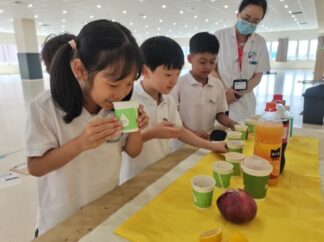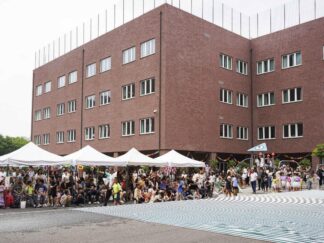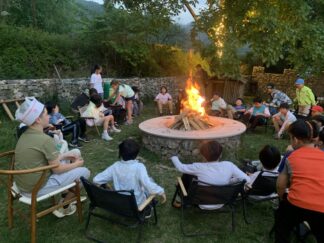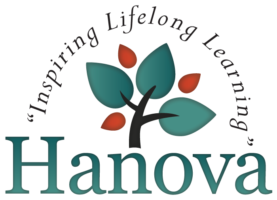Our Primary Years Programme (PYP)
The International Baccalaureate Primary Years Programme (PYP) is designed for students aged 3 to 11.
Primary Years Overview & Philosophy
Xi’an Hanova International School is fully authorized to offer its students the IB Primary Years Programme (PYP) – one of four programmes offered by the IB. It is a programme of international education designed to help students develop the knowledge, understanding, attitudes and skills necessary to participate actively and responsibly in a changing world.
Our Primary Years Programme ensures that learning is engaging, relevant and challenging in order to meet the diverse needs of the student. Our school follows a trans-disciplinary model, whereby themes of global significance frame the learning throughout the primary years, including Early Years. Students are encouraged to make connections between subject areas, and traditional curriculum areas are used as lenses to help students inquire into big ideas.
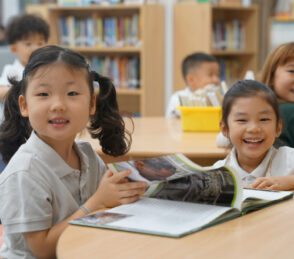
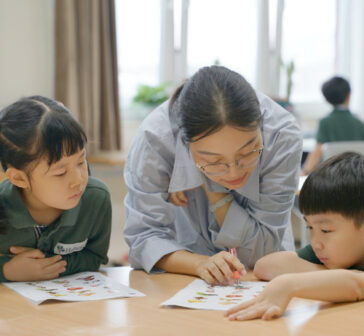
Encouraging students to become active, compassionate and lifelong learners
The IB Learner Profile in the PYP
The aim of all IB programmes is to develop internationally-minded people by encouraging students across the world to become active, compassionate and lifelong learners who understand that other people, with their differences, can also be right. (From the IB Mission Statement).
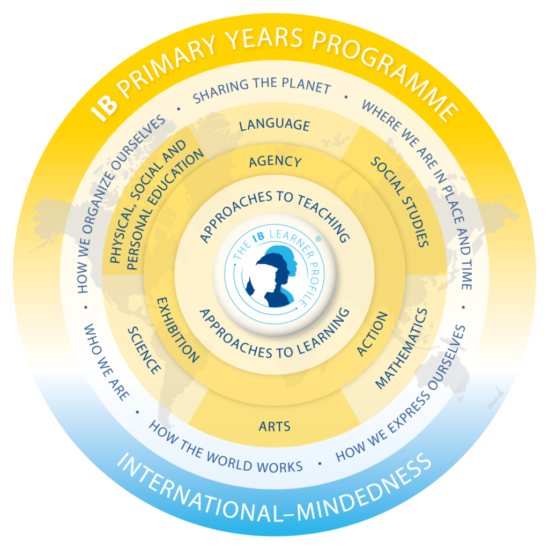
Hanova's IB Learner Profile Attributes
The IB's mission statement aligns with our own Guiding Statement which indicates our Philosophy and Aims. Student are encouraged to develop international mindedness through the fostering of the Learner Profile attributes. These are:
Balanced
Our students understand the importance of intellectual, physical and emotional balance to achieve personal well-being for themselves and others.
Principled
Our students act with integrity and honesty, with a strong sense of fairness, justice and respect for the dignity of the individual, groups and communities. They take responsibility for their own actions and the consequences that accompany them.
Thinkers
Our students exercise initiative in applying thinking skills critically and creatively to recognise and approach complex problems, and make reasoned, ethical decisions.
Caring
Our students show empathy, compassion and respect towards the needs and feelings of others. They have a personal commitment to service, and act to make a difference to the lives of others and to the environment.
Knowledgeable
Our students explore concepts, ideas and issues that have local and global significance. In so doing, they acquire in-depth knowledge and develop understanding across a broad and balanced range of disciplines. (Humanities: History, Geography, Social Sciences, Political Ideologies and Economics)
Communicators
Our students understand and express ideas and information confidently and creatively in more than one language and in a variety of modes of communication. They work effectively and willingly in collaboration with others.
Open-minded
Our students understand and appreciate their own cultures and personal histories, and are open to the perspectives, values and traditions of other individuals and communities. They are accustomed to seeking and evaluating a range of points of view, and are willing to grow from the experience.
Inquirers
Our students develop their natural curiosity. They acquire the skills necessary to conduct inquiry and research and show independence in learning. They actively enjoy learning and this love of learning will be sustained throughout their lives.
Reflective
Our students give thoughtful consideration to their own learning and experience. They are able to assess and understand their strengths and limitations in order to support their learning and personal development.
Courageous/Risk-takers
Our students approach unfamiliar situations and uncertainty with courage and forethought, and have the independence of spirit to explore new roles, ideas and strategies. They are brave and articulate in defending their beliefs.
See our Primary Years Programme in action!
Take some time to look through some of the most recent PYP events and activities at Hanova:
Hanova's PYP Curriculum Framework
While the PYP acknowledges the importance of traditional subject areas (language, mathematics, social studies, science, personal, social and physical education, and arts), it also recognises the importance of acquiring a set of skills in context and of exploring content which transcends the boundaries of the traditional subjects and is relevant to students.
Fostering self-efficacy to enable agency
Students with a strong sense of self-efficacy are more likely to exercise agency. These students are more confident in making choices, which effects the impact they make in their lives. As teachers recognize the importance of learner agency and the significance of self-efficacy, students become partners in the learning process. For this process to be successful, teachers and students need to work close together, and provide timely feedback on the learning process.
The PYP Exhibition
During students final year in the PYP they will take part in the PYP exhibition. The exhibition allows students to explore, document and share their understanding of an issue or opportunity that has personal significance to them. This culminating event is shared with the entire Hanova learning community.
The Early Learner
Early learners, aged 3 – 6 years, have unique needs that have been identified by the PYP. As such, they need approaches to learning and teaching that honour their developmental stage, by identifying the importance of play-based learning. During these years the foundation is laid for all future learning and thus teachers are allowed to make choices and provide opportunities for their learners to flourish. At Hanova, the early learning years takes a holistic approach integrating socio-emotional, physical and cognitive development promoting play, discovery and exploration.
Transdisciplinary transcends subjects
The PYP has six transdisciplinary themes that provide the framework for learning. These themes are globally significant and students learn to appreciate knowledge, conceptual understandings, skills and personal attributes as a connected whole.
These themes are selected for their relevance to the real world. They are described as transdisciplinary because they focus on issues that go between, across and beyond subject areas. The transdisciplinary themes help teachers to develop a programme of inquiry. Teachers work together to develop investigations into important ideas, which require a substantial and high level of involvement on the part of students.
Through the learning process, students examine each theme. Students inquire into, and learn about, these globally significant issues to become competent learners, who are self-driven to have cognitive, affective and social tools to equip them to become lifelong learners.
The PYP Transdisciplinary themes are:
- Who we are.
- Where we are in place and time.
- How we express ourselves.
- How the world works.
- How we organise ourselves.
- Sharing the planet.
Concept driven inquiry
The Concepts are the ‘Big Ideas’ that will drive Unit of Inquiry and promote meaning and understanding. The curriculum framework has been structured around these ‘Big Ideas’, which challenges students to engage critically and creatively in their learning. The PYP is structured around 7 key concepts:
- Form – What is it like?
- Function – How does it work?
- Causation – Why is it like it is?
- Change – How is it changing?
- Connection – How is it connected to other things?
- Perspective – What are the points of view?
- Responsibility – What is our responsibility?
Approaches to learning skills
The IB has identified these essential skills as the broad capabilities students develop and apply during learning and in life
beyond the classroom. The 5 broad skills are broken down into specific sub-skills and developed throughout the learning journey. They are:
- Thinking Skills
- Social Skills
- Communication Skills
- Self Management Skills
- Research Skills
Schools offering the PYP programme commit to the IB’s philosophy of connecting learners worldwide in order to strive towards a better, more peaceful world.
As the IB learning community views the world as the broadest context for learning, and as such recognises the importance of everyone in the school community. These include students and their families as well as all other significant adults in the learners community and lives.
This allows for learning communities to cater for the well-being of their members through a shared understanding and agreements that enables highest quality learning and teaching. At Hanova, students are placed at the heart of learning, which encourages critical and creative thinking, through inquiry, action and reflection.
During a students’ journey through their IB education at Hanova, children are supported to:
- develop their knowledge, conceptual understanding and develop their own approaches to learning.
- become internationally- minded individuals.
- develop the attributes of the IB learner profile.
© 2012-24 Xi’an Hanova International School. All Rights Reserved.


